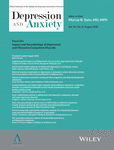The association between valence of social media experiences and depressive symptoms
Data collected at the West Virginia University.
Grant sponsor: the Fine Foundation.
Abstract
Background
Social media (SM) may confer emotional benefits via connection with others. However, epidemiologic studies suggest that overall SM is paradoxically associated with increased depressive symptoms. To better understand these findings, we examined the association between positive and negative experiences on SM and depressive symptoms.
Methods
We conducted a cross-sectional survey of 1,179 full-time students at the University of West Virginia, aged 18 to 30, in August 2016. Independent variables were self-reported positive and negative experiences on SM. The dependent variable was depressive symptoms as measured using the Patient-Reported Outcomes Measurement Information System. We used multivariable logistic regression to assess associations between SM experiences and depressive symptoms controlling for sociodemographic factors including age, sex, race/ethnicity, education, relationship status, and living situation.
Results
Of the 1,179 participants, 62% were female, 28% were non-White, and 51% were single. After controlling for covariates, each 10% increase in positive experiences on SM was associated with a 4% decrease in odds of depressive symptoms, but this was not statistically significant (adjusted odds ratio [AOR] = 0.96; 95% confidence interval [CI] = 0.91–1.002). However, each 10% increase in negative experiences was associated with a 20% increase in odds of depressive symptoms (AOR = 1.20; 95% CI = 1.11–1.31). When both independent variables were included in the same model, the association between negative experiences and depressive symptoms remained significant (AOR = 1.19, 95% CI = 1.10–1.30).
Conclusions
Negative experiences online may have higher potency than positive ones because of negativity bias. Future research should examine temporality to determine if it is also possible that individuals with depressive symptomatology are inclined toward negative interactions.
CONFLICT OF INTEREST
The authors have no conflict of interest to report. The authors confirm that the research presented in this article met the ethical guidelines, including adherence to the legal requirements, of the United States and received approval from the Institutional Review Board of the University of West Virginia.




